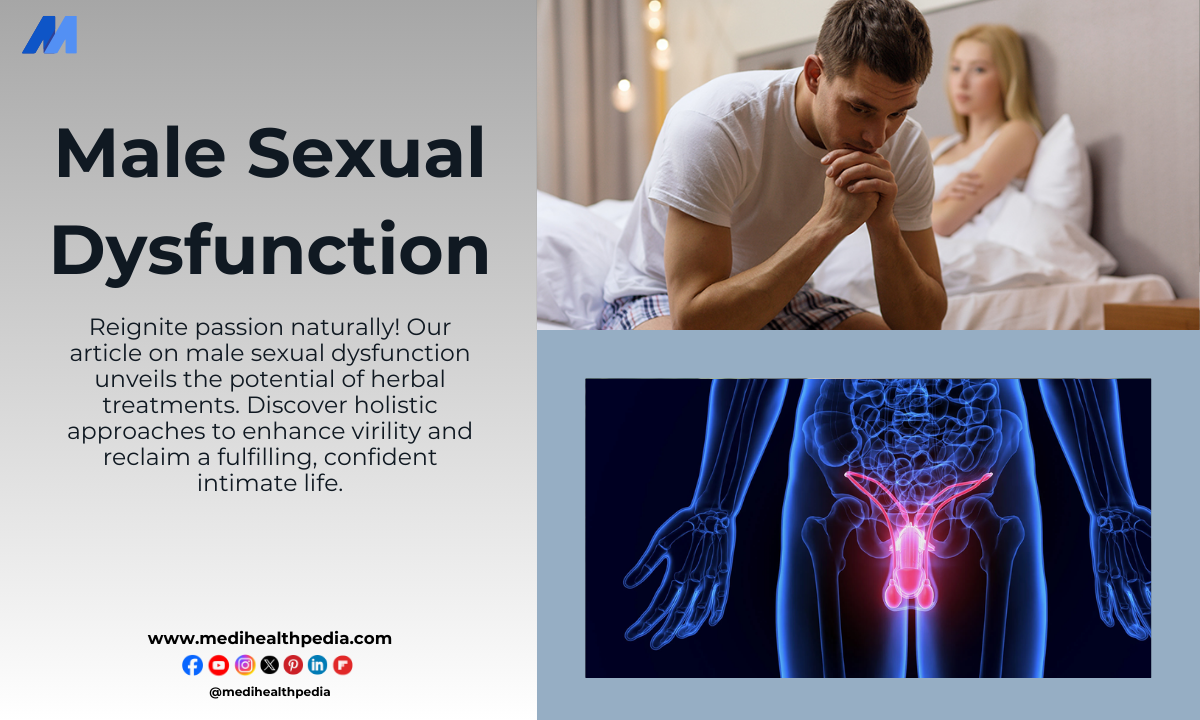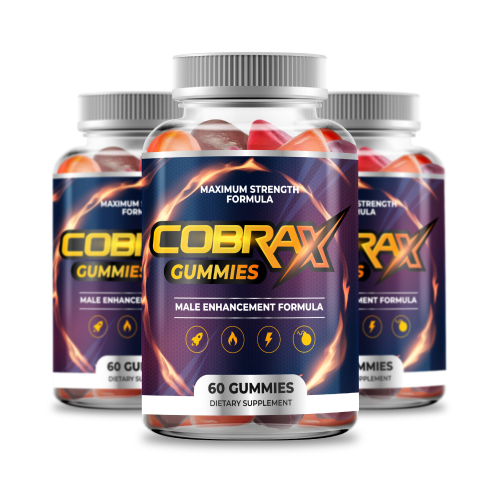Empower Your Relationship: Natural Ways to Combat Male Sexual Dysfunction
Introduction
Male sexual dysfunction refers to variety of issues that interfere with a man’s ability to engage in sexual activity satisfactorily. It encompasses a range of issues, including erectile dysfunction, premature ejaculation, and low libido. These conditions can have a significant impact on a man’s overall well-being, affecting his self-esteem, relationships, and overall quality of life.

Clinical Overview
Male sexual dysfunction encompasses a range of conditions affecting sexual performance, desire, or satisfaction. These may include erectile dysfunction (ED), premature ejaculation (PE), delayed ejaculation (DE), and low libido (reduced sexual desire). It can arise from various physical or psychological factors, such as hormonal imbalances, vascular issues, neurological disorders, medications, stress, anxiety, or relationship problems.
Clinical Presentation
The presentation of male sexual dysfunction varies depending on the specific condition:
- Erectile Dysfunction (ED): Difficulty achieving or maintaining an erection sufficient for satisfactory sexual performance.
- Premature Ejaculation (PE): Ejaculation that occurs sooner than desired, often with minimal sexual stimulation, leading to distress or relationship difficulties.
- Delayed Ejaculation (DE): Difficulty or inability to ejaculate, even with prolonged sexual stimulation.
- Low Libido: Decreased interest in sexual activity, accompanied by reduced sexual thoughts and fantasies.
Men experiencing sexual dysfunction may feel embarrassed, frustrated, or anxious about their performance, leading to further psychological distress and relationship strain.
Basic Investigations
Diagnosing male sexual dysfunction typically involves a comprehensive medical history, physical examination, and may include specific investigations such as:
- Blood Tests: To assess hormone levels, including testosterone, prolactin, and thyroid function.
- Penile Doppler Ultrasound: To evaluate blood flow to the penis in cases of suspected vascular issues contributing to ED.
- Psychological Evaluation: To explore underlying psychological factors such as stress, anxiety, or depression.
- Neurological Assessment: To rule out any neurological disorders affecting sexual function.
These investigations help identify underlying causes and guide appropriate treatment strategies.
Complications
Untreated male sexual dysfunction can lead to various complications, including:
- Relationship Problems: Difficulty with sexual intimacy can strain relationships and lead to communication breakdown or emotional distance.
- Psychological Distress: Persistent sexual dysfunction can contribute to anxiety, depression, low self-esteem, and overall diminished quality of life.
- Reduced Quality of Relationships: Sexual dissatisfaction may impact overall relationship satisfaction and intimacy, leading to dissatisfaction or conflict.
- Underlying Health Issues: In some cases, male sexual dysfunction may be a symptom of underlying health conditions such as cardiovascular disease, diabetes, or hormonal imbalances.
Addressing sexual dysfunction promptly can help mitigate these complications and improve overall well-being.
Conventional Treatment
Treatment for male sexual dysfunction depends on the specific condition and underlying causes but may include:
- Medications: Oral medications such as phosphodiesterase type 5 (PDE5) inhibitors (e.g., sildenafil, tadalafil) for ED, or selective serotonin reuptake inhibitors (SSRIs) for PE or DE.
- Hormone Therapy: Replacement therapy for hormonal imbalances, such as testosterone replacement therapy for low testosterone levels.
- Psychotherapy: Cognitive-behavioral therapy (CBT), sex therapy, or counseling to address psychological factors contributing to sexual dysfunction.
- Vacuum Devices or Penile Implants: Mechanical devices or surgical implants may be considered for ED refractory to other treatments.
Conventional treatments aim to improve sexual function, enhance sexual satisfaction, and address any underlying physical or psychological issues contributing to sexual dysfunction.
Prevention
Preventing male sexual dysfunction involves adopting healthy lifestyle habits and managing underlying risk factors:
- Maintain a Healthy Lifestyle: Regular exercise, balanced diet, adequate sleep, and stress management can help promote overall well-being and sexual health.
- Manage Underlying Health Conditions: Control conditions such as diabetes, hypertension, or cardiovascular disease that can contribute to sexual dysfunction.
- Avoid Substance Abuse: Limit alcohol consumption, avoid illicit drug use, and refrain from smoking, as these can adversely affect sexual function.
- Communicate with Partners: Open communication and mutual understanding with sexual partners can help address relationship issues and reduce sexual performance anxiety.
By prioritizing preventive measures, men can reduce their risk of developing sexual dysfunction and maintain healthy sexual function as they age.
Role of Herbal Medicines
In addition to conventional treatments, some herbal medicines have been studied for their potential benefits in managing male sexual dysfunction. However, evidence supporting their efficacy is limited, and caution should be exercised when considering their use. Some herbal remedies that have been explored include:
- Panax Ginseng: Known for its adaptogenic properties, ginseng has been studied for its potential to improve erectile function and sexual satisfaction.
- Tribulus Terrestris: Believed to enhance libido and sexual performance, Tribulus terrestris has been investigated for its effects on testosterone levels and sexual function.
- Maca Root: Native to Peru, maca root is purported to improve sexual desire and stamina, although clinical evidence is lacking.
- Ginkgo Biloba: With vasodilatory effects, ginkgo biloba has been studied for its potential to improve blood flow to the penis and alleviate symptoms of ED.
While some men may find herbal remedies helpful, it’s essential to consult with a healthcare provider before use, as they may interact with medications or have adverse effects.
Lifestyle Modification
Incorporating healthy lifestyle habits can play a significant role in managing male sexual dysfunction:
- Maintain a Healthy Weight: Obesity is a risk factor for sexual dysfunction, so maintaining a healthy weight through diet and exercise can help improve sexual function.
- Exercise Regularly: Physical activity improves cardiovascular health and blood flow, which can benefit sexual function.
- Eat a Balanced Diet: Nutrient-rich foods support overall health, including sexual health. Include fruits, vegetables, whole grains, lean proteins, and healthy fats in your diet.
- Manage Stress: Stress can contribute to sexual dysfunction, so practice stress-reduction techniques such as mindfulness, meditation, or relaxation exercises.
- Limit Alcohol and Tobacco Use: Excessive alcohol consumption and smoking can impair sexual function, so limit or avoid these substances altogether.
By making these lifestyle modifications, men can enhance their overall health and improve sexual function and satisfaction.
Conclusion
In conclusion, male sexual dysfunction can have a significant impact on men’s overall well-being and quality of life. Exploring natural approaches to address sexual dysfunction, including lifestyle modifications, herbal remedies, acupuncture, and psychological support, can provide potential benefits for improved sexual health. It is essential to seek professional advice when needed to ensure a thorough evaluation and integrated approach to treatment.
With a comprehensive approach that integrates medical intervention, lifestyle changes, and open communication with healthcare providers and sexual partners, men can enhance sexual function, improve quality of life, and foster fulfilling relationships.

